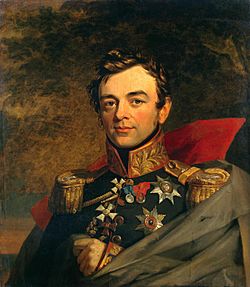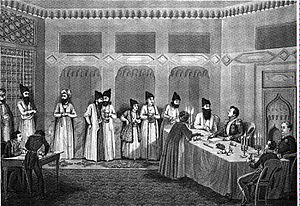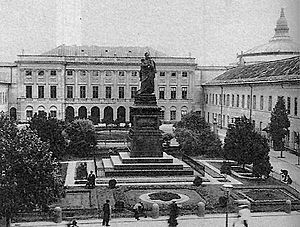Ivan Paskevich facts for kids
Quick facts for kids
Ivan Fyodorovich Paskevich
Erevansky
|
|
|---|---|

Portrait by George Dawe
|
|
| Born | 19 May 1782 Poltava, Russian Empire (now Ukraine) |
| Died | 1 February 1856 (aged 73) Warsaw, Congress Poland, Russian Empire |
| Allegiance | |
| Service/ |
Imperial Russian Army |
| Years of service | 1800–1856 |
| Rank | Field Marshal |
| Battles/wars | Napoleonic Wars Russo-Turkish War (1806–12) Russo-Persian War (1826–28) Russo-Turkish War (1828–29) November Uprising Hungarian Campaign Crimean War |
| Awards | Order of St. Andrew Order of St. George Order of St. Vladimir Order of St. Anna Order of St. Alexander Nevsky Order of the White Eagle (Russian Empire) Gold Sword for Bravery |
| Signature | |
Count Ivan Fyodorovich Paskevich (born May 19, 1782 – died February 1, 1856) was an important military leader in the Russian Empire. He came from a Cossack family. Paskevich is well-known for leading Russian forces in several major conflicts. These included the Napoleonic Wars, the Russo-Persian War (1826–28), and the November Uprising in Poland. He also played a role in the early part of the Crimean War. In Russian history, he is remembered as a very successful military commander.
Paskevich started his career as an officer during the Napoleonic Wars. He fought in famous battles like Austerlitz and Borodino. After these wars, he became a key leader in the Russo-Persian War (1826–28). For his success, he was made a Count in 1828. Later, he became the governor of Poland in 1831 after putting down a rebellion. He also helped stop the Hungarian Revolution of 1848. His last military action was during the Crimean War. Ivan Paskevich passed away in Warsaw in 1856. He reached the highest military rank, Field Marshal, in the Russian army. He also held this rank in the Prussian and Austrian armies.
Contents
Early Life and Education
Ivan Paskevich was born in Poltava on May 19, 1782. His family, the Paskevichs, were part of the Zaporozhian Cossack gentry. This meant they were from a respected and often military-focused background. He received his education at the Page Corps, a special military school. He did very well there and quickly moved up. In 1800, he became an officer in the Guards. He was also chosen to be an aide-de-camp to the Tsar. This was a great honor for a young officer.
Early Military Career
Fighting in the Napoleonic Wars
Paskevich first saw active fighting in 1805. He was part of the army sent to help Austria against France. He took part in the Battle of Austerlitz on December 2, 1805. In this battle, the Austrian and Russian troops were defeated by the French army led by Napoleon.
From 1807 to 1812, Ivan Paskevich fought against the Ottomans. He showed great skill and bravery in these campaigns. Because of his actions, he became a general officer when he was only 30 years old. During the war with France from 1812 to 1814, he led the 26th infantry division. He was promoted to lieutenant general. During and after Napoleon's invasion of Russia, Paskevich fought in several major battles. These included Borodino, Dresden, Leipzig, and Paris in 1814. Ivan Paskevich later wrote about some of his experiences during these wars.
Wars in the 1820s: Persia and Turkey

Before the Russo-Persian War (1826–1828), Paskevich was a Lieutenant General. He was made commander of the 1st Guard Infantry. The future Tsar Nicholas I, who was the brother of Tsar Alexander I, served in this unit. This started a close relationship between Paskevich and the future Tsar. Nicholas I even called Paskevich "father-Commander."
When the Russo-Persian War (1826–1828) began in 1826, Paskevich was appointed second-in-command. In the spring of 1827, he took over as the main commander. Under his leadership, Russian forces captured Echmiadzin and the Nakhichevan Khanate from the Persians. After the Persians tried and failed to take back Echmiadzin, the Tsar rewarded Paskevich. He was given the title "Erivanskii," meaning Count of Yerevan. He also received a million rubles and a special sword decorated with diamonds.
Right after this, the Russo-Turkish War (1828–1829) began. Paskevich successfully led the Russian forces on the eastern front in the Caucasus. For his success in this war, he was made a Field Marshal at 47 years old. In 1830, he was involved in the Caucasian War in what is now Dagestan. He worked with a respected Muslim cleric, Mir-Fatah-Agha, from Iran. Paskevich hoped that Mir-Fatah's influence would help Russia keep control in the Caucasus. Together, they helped keep the region stable for many years.
Polish Uprising and Hungarian Revolution

In June 1831, the commander of Russian troops in Poland died. Paskevich was chosen to take his place and put down the Polish uprising. His armies moved slowly after the Battle of Ostrołęka (1831) in May. However, Paskevich proved himself at the Battle of Warsaw (1831). This battle ended Polish hopes of regaining independence.
After this victory, Paskevich was given the title Prince of Warsaw. He was also made the governor of the Kingdom of Poland. During his time as governor, Poland's self-rule was greatly reduced. This period became known in Poland as the "Paskevich Night." It was a time of strict political and economic control, and efforts to make Polish culture more like Russian culture.
When the Hungarian Revolution of 1848 broke out, Paskevich was again called to action. He was put in charge of the Russian troops sent to help Austria. He eventually forced the Hungarians to surrender at Világos.
Later Career and Legacy
In 1854, Paskevich took command of the Army of the Danube. This army was fighting the Turks at the start of the conflict that became the Crimean War. He began to surround the city of Silistria. However, Paskevich believed the campaign should stop because Austria threatened to join the war. On June 9, he was injured in battle. He had to return to Russia and handed command of the army to General Mikhail Dmitrievich Gorchakov.
Paskevich died in Warsaw in 1856. A monument was built to him in Warsaw in 1870, in front of the Koniecpolski Palace. However, it was taken down by the Poles in October 1917. His son later reburied his remains in the family tomb at the Homel Palace. Paskevich's titles, Prince of Warsaw and Count of Erevan, ended when his only son, Fedor Paskevich, died in 1903.
Images for kids
 | Misty Copeland |
 | Raven Wilkinson |
 | Debra Austin |
 | Aesha Ash |




